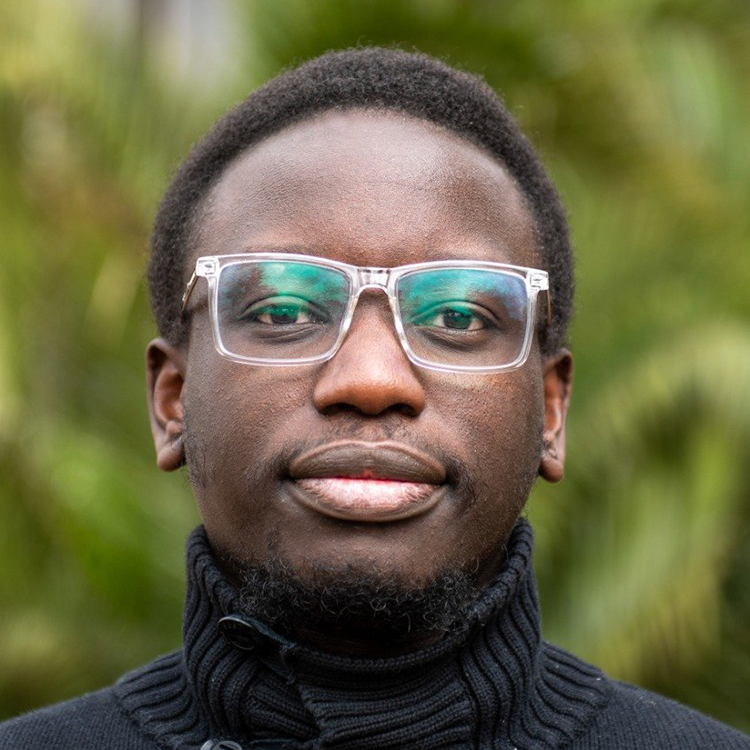12 September 2023
DisinfoCon
DisinfoCon by DRI brings together civil society, policymakers, journalists and AI practitioners to discuss ways our societies can create values-based approaches to the AI revolution affecting our democracies.
Programme
12 September 2023
Maschinenraum, Zionskirchstraße 73a, 10119 Berlin
09:00
Welcome coffee
09:30
Opening remarks
Welcoming you to DisinfoCon!
With Michael Meyer-Resende and Heather Dannyelle Thompson, Democracy Reporting International
Watch online streaming
09:45
Interview with with Dr. Peter Ptassek, Director for Strategic Communication and Public Diplomacy at the German Federal Foreign Office
With Nicola Schmidt, Democracy Reporting International
Watch online streaming10:00
Keynote speech: The New Algorithm of Foreign Affairs
AI is probably the most compelling technology of our time and will transform society as we know it. AI’s impact will be widespread – from the daily life of millions of citizens to the dynamics of international politics. One such example is how AI is changing the disinformation landscape and abilities. AI powered disinformation can erode the foundational trust in democratic elections. This calls for democracies to show the way forward. As well as a multistakeholder dialogue between governments, civil society and the private sector. Making all voices heard.
- By Anne Marie Engtoft Meldgaard, Tech Ambassador, Ministry of Foreign Affairs Denmark
10:15
Will generative AI be the end of democracy?
ChatGPT was released less than a year ago, but it has brought the AI revolution to the public eye sparking hope, hype, critique and panic. But what is the reality? We start our conference with a one-to-one debate: can AI help with our most pressing challenges or are the dangers to democracy real and present?
Speakers
- Dr. Renana Keydar, Senior Lecturer, Faculty of Law, Center for Digital Humanities, The Hebrew University of Jerusalem
- Pegah Maham, Project Director Artificial Intelligence & Data Science, Stiftung Neue Verantwortung
Moderated by Jennifer Baker
Incl. Q&A with our on-site and online audience.
Watch online streaming
11:00
Coffee break and networking
11:45
Problems and solutions for inclusive AI practices
We’ve seen it before – algorithms and AI perpetuate age-old systemic biases. Democracies, already under threat from increased polarisation and hate speech, need to be safeguarded with a value-based approach to AI development. In this session, we look at real-world case studies and examine their profound consequences on society.
Speakers:
- Mutale Nkonde, Founding CEO of AI for the People
- , Data Economy/AI Ethics Advisor at GIZ
Moderated by Beatriz Almeida-Saab, Democracy Reporting International
Incl. Q&A with our on-site and online audience.
Watch online streaming
12:30
Regulating AI to safeguard democracy: Where to start?
As generative artificial intelligence (gAI) grows in sophistication and availability, calls for swift regulation have been asked and answered. Our panel will discuss the fundamental components of such hard and soft regulation and dissect their differing approaches in Europe, the USA, and beyond.
Speakers
- Prof. Dr. Joanna Bryson, Professor of Ethics and Technology, Hertie School of Governance
- Craig Matasick, Policy Analyst, Organization for Economic Cooperation and Development (OECD)
Moderated by Dr. Jan Nicola Beyer, Democracy Reporting International
Incl. Q&A with our on-site and online audience.
Watch online streaming
13:15
Lunch
14:35
The hidden costs of the rise of AI
The speed, scale and growth of gAI has triggered remarkable technological advances. But that speed has come at a cost: it is humans, often from already marginalised communities, who are tasked to train gAI machines, often by confronting violent and distressing content. Join us for a candid discussion.
Speakers
- Odanga Madung, Senior Researcher for Elections & Platform Integrity, Mozilla Foundation
- Richard Mathenge, Administrator of the African Content Moderators Union
Moderated by Heather Dannyelle Thompson, Democracy Reporting International
Incl. Q&A with our on-site and online audience.
Watch online streaming15:15
Exploring AI detection and potential
The better the AI, the harder to detect. The harder to detect, the easier to exploit. Can we rely on technical solutions, such as provenance, to keep the information space transparent? And how can we know what is real and what is synthetic? We tackle both questions in this lightning talk.
Speaker
- Kate Brightwell, Head of Strategy & Engagement, Content Authenticity Initiative EMEA, Adobe
- Claire Leibowicz, Head of the AI and Media Integrity Program, Partnership on AI (PAI)
Moderated by Lena-Maria Böswald, Democracy Reporting International
Incl. Q&A with our on-site and online audience.
Watch online streaming15:55
Coffee break and networking
16:30
The DSA in action
Starting in August, the Digital Services Act (DSA) applies to Very Large Online Platforms (VLOPs). Elections in Slovakia, Luxembourg, and Poland will be among the first to test the waters: will the DSA rise to the ocassion? And how can we strengthen it in the face of the upcoming European Parliament elections?
Speakers
- Katarína Klingová, Senior Research Fellow, GLOBSEC
- Jakub Rybnikár, Analyst and DSA Officer, Council for Media Services.
Moderated by Richard Kuchta, Democracy Reporting International
Incl. Q&A with our on-site and online audience.
Watch online streaming17:15
Concluding remarks
Thank you for attending DisinfoCon!
With Michael Meyer-Resende, Democracy Reporting International.
17:30 – 19:00
Happy Hour
Speakers

Anne Marie Engtoft Meldgaard
Tech Ambassador
Office of Denmark’s Tech Ambassador, Ministry of Foreign Affairs of Denmark
Anne Marie Engtoft Meldgaard is Denmark’s Tech Ambassador. She is responsible for representing the Danish government to the global tech industry and leading Danish efforts in global technology governance. She and her team have a global mandate and physical presence in Silicon Valley, Copenhagen and Beijing, transcending borders in rethinking the traditional understanding of diplomatic representation.

Dr. Peter Ptassek
Director for Strategic Communication and Public Diplomacy
German Federal Foreign Office
Dr. Peter Ptassek is the Director for Strategic Communication and Public Diplomacy at the German Federal Foreign Office. Prior to this, he served in different capacities including as the German Ambassador to Colombia, Director for EU Basic Issues and Deputy Head of the Federal Foreign Office’s European Directorate General.

Jennifer Baker
Event Moderator
Jennifer Baker, better known as Brusselsgeek has been a journalist in print, radio and television for 20 years, specialising in EU policy for over 10. She has worked across a wide range of media and has experience in navigating the political quagmire of the EU. She regularly features as an EU expert on BBC radio, Euronews, SkyNews and others, and hosts Brussels’ weekly roundup show TOTW for Euractiv.

Dr. Renana Keydar
Senior Lecturer of Law and Digital Humanities
Hebrew University of Jerusalem
Renana Keydar is a Senior Lecturer of Law and Digital Humanities, Academic Director of the Center for Digital Humanities at the Hebrew University and Head of the Alfred Landecker Lab for the Computational Analysis of Holocaust Testimonies. Her research is focused on the analysis of legal and personal narratives of mass atrocity and systematic human rights violations using advanced computational text analysis techniques in DH and NLP.

Pegah Maham
Project Director Artificial Intelligence & Data Science
Stiftung Neue Verantwortung
Pegah Maham is the Project Director of Artificial Intelligence & Data Science at the Stiftung Neue Verantwortung. Her interest lies in the measurement and forecasting of progress in AI, its risks, and governance. Together with the VDE, she is currently working on AI trust labels on fairness and robustness. She is the co-founder of the European Policy Data Science Network which connects data scientists in NGOs, think tanks, public policy and administration.

Mutale Nkonde
CEO and Founder
AI for the People
Mutale Nkonde is an AI Policy Advisor, CEO and Founder of AI for the People. She is also a policy fellow at the Oxford Internet Institute and completing an MA in American Studies at Columbia University where her research focuses on the ethical use of AI. AI for the People is currently working on the UN’s Business and Technology Project on their technology and gender and Generative AI workflows.

Luísa Franco Machado
Data Economy/AI Ethics Advisor
Deutsche Gesellschaft für Internationale Zusammenarbeit (GIZ) GmbH
Luísa Franco Machado is a Data Economy/AI Ethics Advisor at GIZ. She is an award-winning international activist for digital rights and data justice and a technical advisor in feminist data economy for international organisations worldwide. Her policy research focuses on technology, feminism and socio-economic development. By sharing her research findings in an accessible language on social media, she has reached more than 10 million people.

Prof. Joanna Bryson
Professor of Ethics and Technology
Hertie School
Prof. Joanna Bryson is a professor of Ethics and Technology at the Centre for Digital Governance, Hertie School. Her career spans over two decades with broad expertise in AI ethics and policy. Her current focus is on the impacts of communication and computation technology on human societies and new models of governance for AI and digital technology.

Craig Matasick
Information Integrity Team Lead – Public Sector Integrity Division
Organization for Economic Cooperation and Development (OECD)
Craig Matasick is the Information Integrity Team Lead in the Public Sector Integrity Division at the Organization for Economic Cooperation and Development (OECD). He is responsible for coordinating the OECD DIS/MIS Resource Hub by identifying and helping governments implement policy and regulatory responses to disinformation and reinforcing information integrity.

Odanga Madung
Senior Researcher for Elections and Platform Integrity
Mozilla Foundation
Odanga Madung is the Senior Researcher for Elections and Platform integrity at the Mozilla Foundation and a data journalist based out of Nairobi. His recent work centers on disinformation for hire, hate speech, and content moderation, revealing the harm caused to ‘rest of the world countries’ by technology giants’ negligence and centralization.

Richard Mathenge
Administrator
African Content Moderators Union
Richard Mathenge is the ChatGPT Team Lead and Content Moderator at Sama AI, Kenya. He is an active unionist in content moderation work involved heavily in sensitizing current and prospective content moderators around Africa of their rights in as far as content moderation is concerned.

Kate Brightwell
Head of Strategy & Engagement, Content Authenticity Initiative EMEA
Adobe
Kate Brightwell is the Head of Strategy & Engagement, Content Authenticity Initiative EMEA at Adobe. Her work involves driving a community of media and tech companies, NGOs, academics, and others working to promote the adoption of an open industry standard for content authenticity and provenance.

Claire Leibowicz
Head of AI and Media Integrity
Partnership on AI (PAI)
Claire Leibowicz is the Head of the AI and Media Integrity Program at the Partnership on AI (PAI). The AI and Media Integrity team works on projects at the intersection of AI, information integrity, and public discourse. Her current work centers on synthetic and manipulated content, methods for conveying disinformation to online audiences, and content targeting and ranking systems.

Alberto Rabbachin
Deputy Head of Unit
European Commission.
Alberto Rabbachin is the Deputy Head of Unit at the European Commission. He deals with the European Commission policy to tackle disinformation particularly with the Code of Practice on Disinformation. Previously, he was with the Massachusetts Institute of Technology (MIT) in Boston.

Katarína Klingová
Senior Research Fellow
GLOBSEC Policy Institute
Katarína Klingová is a Senior Research Fellow at the GLOBSEC Policy Institute. As a member of GLOBSEC’s Centre for Democracy & Resilience, she analyses disinformation and influences operations in the Central Europe region. She has also authored and co-authored analyses on the impact of information operations and social media on a democratic society and elections, building societal resilience against hybrid threats and strategic communication.

Jakub Rybnikár
Analyst and DSA Officer
Council for Media Services
Jakub Rybnikár is an Analyst and Research Officer at the Council for Media Services, the Slovak media authority . Previously, he worked at an EDMO hub and EU-advocacy group. Jakub is also a co-author of several publications on online harms and platform regulation. His work focuses on the nexus between digital media, democracy and security
